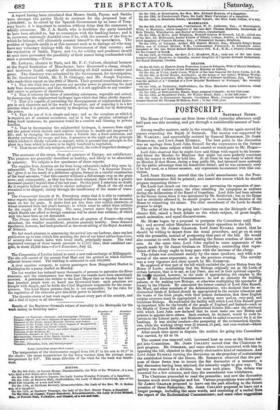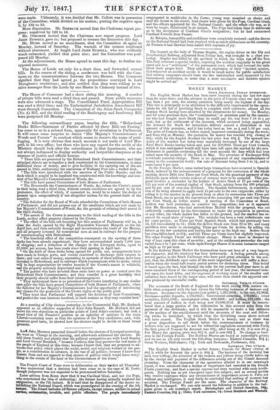POSTSCRIPT.
SATURDAY NIGHT.
Among smaller matters, early in the evening, Mr. Huxe again moved for papers respecting the Rajah of' Sattarah. The motion was supported by Mr. Waxixr; and successfully resisted by General MORRISON, Sir Jorni HOEHOUSE, and Lord Joint RUSSELL. The best point in the discussion was an apology from Lord John Russell for the expressions in the former debate on the same subject which had caused so much pain to Mr. Mune- Lord John observed that he might have said things with regard to his honour- able friend the Member for Montrose that might not seem perfectly consistent with the respect in which he held him. At all times he was ready to admit that no Member of that House, during a long public life had laboured more zealously for the public advantage than his honourable friend; and he was extremely sorry if he had used, on a former occasion, any expressions inconsistent with that con- viction.
Lord Joust RUSSELL moved that the Lords' amendments on the Poor- law Administration Bill be printed; and stated the course which he should propose respecting them— The Lords had struck out two clauses ; one preventing the separation of mar- ried couples of mature years, the other admitting the ratepayers as auditors daring the deliberations of the Board of Guardians. Lord John had been adverse to the former clause when it was introduced by Mr. Borthwick; but as the House had so decidedly affirmed it, he should propose to maintain the decision of the House by reinserting the clause. The other amendment of the Lords he should propose to adopt.
The order of the day for going into Committee on the Bishopric of Man- chester Bill, raised a fresh debate on the whole subject, of great length, much animation, and equal discursiveness. • Mr. HUME began by a proposal to postpone the Committee until Mon- day; and several other Members renewed their opposition to the bill.
In reply to Sir JAMES GRAHAM, Lord Jonw RUSSELL stated, that he should be willing to depart from the usual procedure, and go on at once with the preamble, instead of postponing that part of the bill. He would also consent to omit the words indicating the future erection of three new sees. At the same time, Lord John replied to some arguments of the speech made by Sir James Graham on Thursday; contending that super- vision of the clergy ought to keep pace with the increase of the clergy.
The debate was continued mainly by the same speakers, and with a re- newal of the same arguments, as on the previous evening. The novelty was a very vigorous and close speech by Mr. ROEBUCK. He approved of that part of the bill which excluded the junior Bishop from the House of Lords; maintaining that the Bishops originally sat as the Lords of certain baronies, that is to say, as Lay Peers, and not in their spiritual capacity. He tot* objected, however, to the mode of appropriating the surplus in the hands VII the Ecclesiastical Commissioners: he saw no necessity Er building *am.., or for making new Bishops, or otherwise multiplying the spectacles of luxury in the Church. He contrasted the former conduct of Lord John Russell, Mr. Ward, and other members of the Administration, who declared that the ec- clesiastical funds of Ireland should be appropriated to the secular education and the wants of the Irish people, with their present declaration, that these English surplus revenues must be appropriated to making more useless, over-paid, and luxurious Bishops. He contrasted the facility with which Lord John Russell gave up important bills for the benefit of the people of England and Ireland—such as the Health of Towns Bill and the Encumbered Estates Bill—and the obstinacy with which Lord John now declared that he must make one new Bishop and promise to appoint three others. Such conduct, he declared, would be most in- jurious to the Liberal party, and Ministers would be called to account for it at the hustings. It was similar conduct—the pampering of the ecclesiastical dignita- ries, while the working clergy were ill treated, ill paid, and over-worked—which provoked the French Revolution of 1789.
After much time spent in dispute, the motion for going into Committee was carried, by 63 to 18.
The contest was renewed with increased heat as soon as the House had got into Committee. Mr. Josue Cola.= moved that the Chairman re- port progress. Mr. OSBORNE, and some others who concurred with him in opposing the bill, objected to this purely obstructive kind of resistance. And Lord Joint RUSSELL turning the discussion on the propriety of maintaining the established forms of the House, Mr. Ronnucm observed that the pur- pose of those forms :was to insure the fair discussion of a measure: a fair discussion having been attained, the minority ought to give way. The gallery was cleared for a division, but none took place. The debate was renewed for a few minutes, and then the amendment was withdrawn. The Chairman proceeded to read the preamble; and now the discussion became much more irregular and hot. Various propositions were advanced: Sir JAMES Gasassi proposed to leave out the part alluding to the future creation of three Bishoprics; Mr. Joint COLLETT proposed to leave out a longer passage, including the same words, and consisting of a recital from the report of the Ecclesiastical Commissioners; and some other suggestions
were made. Ultimately, it was decided that Mr. Collett was in possession of the Committee; which divided on his motion; putting the negative upon it, by 132 to 33. More disputation. Mr. ROEBUCK moved that the Chairman report pro- gress: negatived by 129 to 18. Mr. OSBORNE moved that the Chairman now report progress. Lord Joint Russutn gave in; but proposed to resume the discussion this day.
Mr. HUME moved as an amendment, that the Committee sit again on Monday, instead of Saturday. The warmth of the contest continued without abatement. At length Lord Join; RussELL' who was evidently much exhausted, yielded that point also; and the Committee was post- poned till Monday.
At the adjournment, the House agreed to meet this day, to further un- opposed measures.
The House of Lords sat only for a short time, and forwarded several bills. In the course of the sitting, a conference was held with the Com- mons on the communications 'between the two Houses. The Commons signified that they had agreed to the propositions conveyed in Lord Brougham's resolutions; and also notified that they were willing to re- ceive messages from the Lords by one Master in Chancery instead of two.



























 Previous page
Previous page